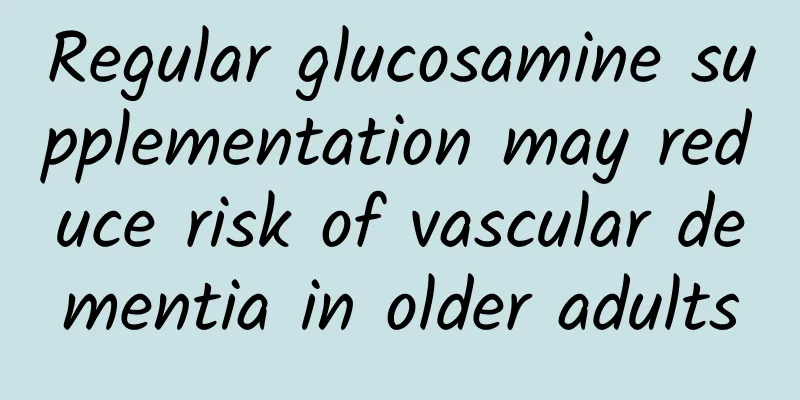Regular glucosamine supplementation may reduce risk of vascular dementia in older adults

|
In countries such as the UK and Australia, about 20% of the population chooses to take glucosamine supplements as a daily health product. Glucosamine is a commonly used non-vitamin, non-mineral dietary supplement. It is a natural amino monosaccharide that is widely used to relieve osteoarthritis and joint pain. Glucosamine has a relatively high safety and potential anti-inflammatory effect. Recent studies have shown that glucosamine use may be associated with better cognitive function. However, the relationship between glucosamine use and dementia risk is unclear, and no study has systematically evaluated the modifying effects of apolipoprotein E (APOE) gene polymorphisms, baseline cognitive function, and other nutrient supplements on this association. Based on this, Professor Qin Xianhui's team at the National Clinical Research Center for Kidney Diseases of Southern Hospital conducted relevant research. The study found that regardless of APOE genotype and baseline cognitive function, regular glucosamine supplementation was significantly negatively correlated with the occurrence of vascular dementia in the elderly population. The study was published in the journal Alzheimer's Research & Therapy , with Dr. Zhou Chun as the first author and Professor Qin Xianhui as the corresponding author. This prospective cohort study based on the UK Biobank database included more than 210,000 elderly people aged 60 and above who had no history of dementia at baseline. The average age was 64 years, 53% were women, and 24.6% of the participants reported regular use of glucosamine supplements. After 12 years of follow-up, 1,039 cases of vascular dementia, 1,774 cases of Alzheimer's disease, and 122 cases of frontotemporal dementia occurred among the participants. The analysis found that compared with participants who did not regularly supplement with glucosamine, participants who regularly supplemented with glucosamine had a significantly reduced risk of vascular dementia by 18%, but glucosamine supplementation had no significant effect on the risk of Alzheimer's disease and frontotemporal dementia. In people who used calcium supplements and did not use zinc supplements, regular glucosamine supplementation had a stronger negative correlation with the risk of vascular dementia. However, regardless of APOE genotype and baseline cognitive function, regular glucosamine supplementation showed a similar significant negative correlation with the risk of vascular dementia. (The picture comes from the Internet, the copyright belongs to the original author) Overall, this prospective, large-scale study of older adults suggests that regular glucosamine supplementation may be a simple, feasible strategy for preventing vascular dementia in the elderly population. References: Zhou C, Zhang Y, Yang S, Ye Z, Wu Q, Liu M, He P, Zhang Y, Qin X. Habitual glucosamine use, APOE genotypes, and risk of incident cause-specific dementia in the older population. Alzheimers Res Ther. 2023 Sep 9;15(1):152. Editor | Zhou Chunxianghao Audit | Qin Xianhui |
<<: The cause of miscarriage turned out to be this
>>: Rumor debunked: If you eat “photosensitive foods”, your sun protection efforts may be in vain?
Recommend
Treatment of irregular menstruation in women
Many women suffer from irregular menstruation due...
What to do if you have period pain
Most women will experience various physical probl...
If I can't detect a strong positive result, will I ovulate?
When couples are preparing for pregnancy, they pa...
What are the main types of oral contraceptives?
Nowadays many people are very dependent on birth ...
Ding Dong! Keep this eye protection guide after the holidays to help you keep your eyes bright all year round
Although the Spring Festival holiday has ended, t...
When is the best time for women to check their hormone levels?
The six-item hormone test (six-item sex hormone t...
What should I do if I experience hypothyroidism during pregnancy?
What should I do if I experience hypothyroidism d...
The positive rate of influenza A continues to rise. Should I take some oseltamivir to prevent it?
Mycoplasma pneumoniae infection has not yet subsi...
If I have onychomycosis, do I need to remove the nail to treat it?
Not really Onychomycosis is the common name for o...
Can I take donkey glue blood-replenishing granules during menstruation?
We know that every woman will have menstruation b...
Breast hyperplasia has blood flow signals
Breasts are a feature of female charm. They not o...
I have frequent nipple pain during breastfeeding. How can I get better quickly?
The breastfeeding period is the happiest moment i...
Which is more harmful to the body, induced labor or natural birth?
In daily life, induced labor is a way for women t...
Can I take folic acid tablets when I am one month pregnant?
Research shows that it is best to take folic acid...
What is the reason for black menstrual blood and less amount?
Menstruation is also called the physiological per...









